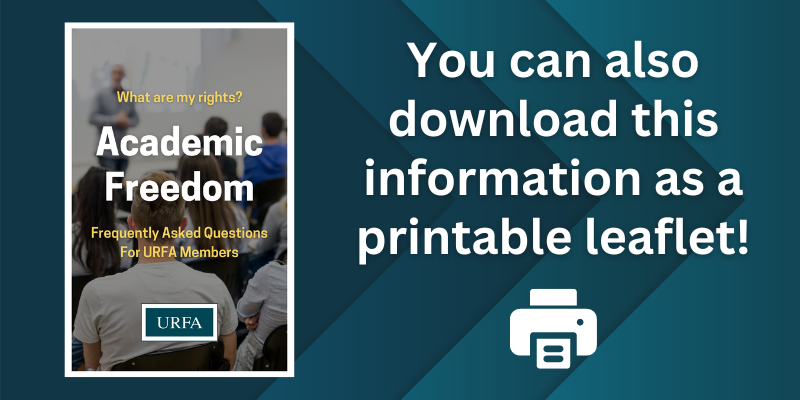Academic Freedom

Download the Printable Leaflet Here (1 MB)
What is academic freedom?
Academic freedom is a fundamental right that supports the academic mission of post-secondary institutions.
This democratic form of expressive freedom allows academics to engage in debate and research within the scope of their work without fear of reprisal. Academic freedom and freedom of speech are different, although the two are sometimes confused.
Academic freedom is not automatic — it is a negotiated right that comes from our union’s collective agreements. That’s why URFA is always working to improve existing language through bargaining. Language has been negotiated into collective agreements with Campion College, First Nations University of Canada, Luther College, and the University of Regina.
Why is academic freedom important?
Academic freedom is essential to the performance of our duties as scholars and teachers, and in the collegial governance process. Working conditions and members’ rights can be negatively impacted by a lack of academic freedom.
Our right to academic freedom needs to be constantly defended. The Canadian Association of University Teachers (CAUT) recently published a statement on how academic freedom can quickly erode in times of war, conflict, and social unrest, which can be read here.
Where can I learn more about academic freedom?
There are lots of educational resources about academic freedom which can be accessed for free online.
Demystifying Academic Freedom Podcast by Marc Spooner (U of R) and Stephen Hurley (voicEd Radio Canada) explores academic freedom in Canada’s post-secondary landscape, highlighting current tensions, new opportunities, and ongoing challenges. Listen to the podcast here.
The Four Components of Academic Freedom is a brief overview of academic freedom in Canada written by CAUT. Read it here.
Scholars at Risk (SAR) is a global network and manages the Academic Freedom Monitoring Project. Their latest Free to Think report documented 409 attacks on scholars, students, and their institutions in 66 countries and territories from 2022 – 2023. There was one documented incident in Canada. Learn more here.
Journal of Academic Freedom, published by the American Association of University Professors, is an open access and peer-reviewed journal about academic freedom and its relation to shared governance, tenure, and collective bargaining. Learn more here.
Academic Freedom Index Project is a research team from Germany and Sweden that publishes an annual global index on their website.
What do URFA’s collective agreements say?
URFA’s collective agreements representing academic members all have language regarding academic freedom under Article 2 — Academic Freedom & Responsibilities.
Campion College (2017 – 2021)
https://www.urfa.ca/files/Camp… (page 3)
First Nations University of Canada — Academic (2018 – 2022)
https://www.urfa.ca/files/FNUn… (page 3)
First Nations University of Canada — Sessionals (2020 – 2022)
https://www.urfa.ca/files/FNUn… (page 2)
Luther College (2017 – 2021)
https://www.urfa.ca/files/Luth… (page 3)
University of Regina — Academic (2021 – 2027)
https://www.urfa.ca/files/2021… (page 3)
Note: Collective agreement language may change through subsequent rounds of bargaining. Please always refer to the URFA website for the most recent documents at: urfa.ca/bargaining-units
